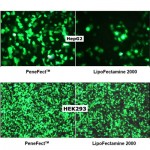Hot Products
Top 100 Antibodies
Customer Testimonials
"I have tried your LiPure™ Plasmid Mini Kit. The Miniprep kit is easy-to-use. Plasmid DNA purified with this kit is high quality, free of potential interfering reagents, the sequencing result is excellent. We will order the kit to replace our current brand. Thank you for your sample!"
"We have tested different samples from vendors. Your product is suitable for our research. We are planning to order one LiFect293™ Transfection Reagent. Thanks!"
















